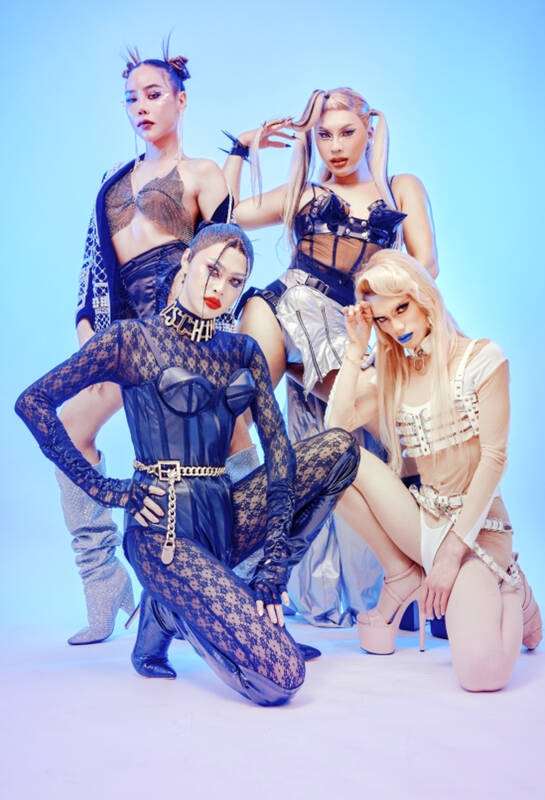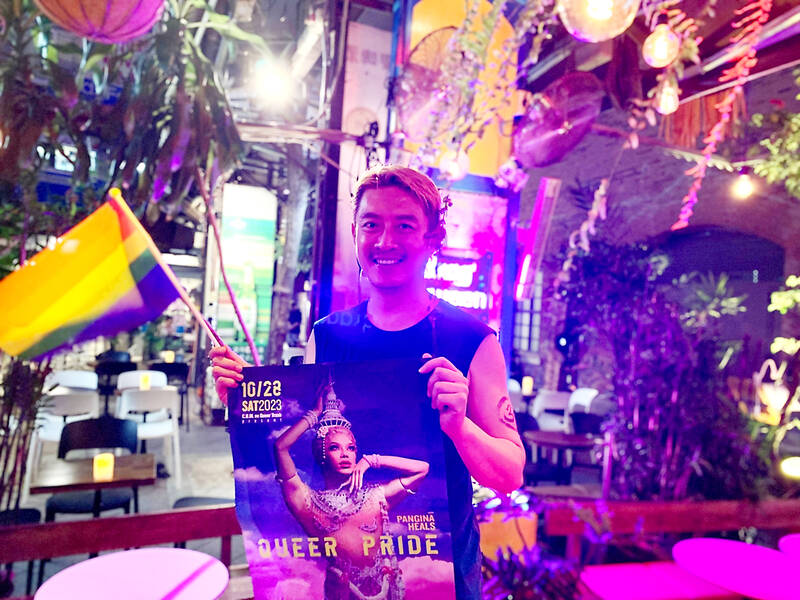As Chiang Wei (薔薇) takes to the stage and begins dancing under the neon lights, their shiny black leather heels and eye makeup glitter in the dark. The show Chiang Wei and a dozen other queens are taking part in is just one of the many drag events taking place every weekend in the city.
Drag is the art of dressing up as a different gender and dancing, singing and lip-syncing for entertainment purposes. Some accounts trace its roots back to ancient Greece and Rome, where men played female theater roles. It was also popular in Japanese theater and Peking opera performances in China during the 17th and 18th centuries.
However, because of the stigma that surrounds drag, a lot of its history is muddled.

Photo: CNA
INSPIRING OTHERS
In Taiwan, shows started to become popular in the 90s, before experiencing a decline and a subsequent revival in recent years, parallel to the rise of the smash hit show RuPaul’s Drag Race, which brought the popular subculture into the mainstream.
“I first started watching RuPaul’s Drag Race in the summer of 2018, and I was inspired by how enthusiastic the contestants were about drag, so I decided to give it a go,” 25-year-old Chiang Wei, who uses the pronoun they, said before their performance at Locker Room on Sept. 9.

Photo: CNA
“I wasn’t really a drag queen at first. I started going to parties and events from time to time, where I would wear drag makeup, and then later I participated in some competitions and did well. People kept asking me to perform and so here I am now,” said Chiang Wei, who was born Chiang Wei-cheng (江威成) and whose stage name means “rose.”
As well as discussing what inspired them, Chiang Wei emphasized that it was very meaningful that their work has also been inspiring other queens.
“At the beginning of my career, I posted drag makeup tutorials on my YouTube channel and Instagram, and people have told me that they became drag queens after watching them.”
Hoping to continue to inspire hopeful drag queens, Chiang Wei later founded the drag house “The Haus of WOMEN” to help more newcomers in the industry.
A drag “house” (sometimes spelled as “haus”), is a drag queen “family” that brings together a range of queens. A house is usually led by a “house mother,” who is seasoned in drag and looks out for and mentors their house “children.”
“As a ‘house mother,’ I spot unique traits or sparks in my ‘daughters,’ and help transform them from unpolished diamonds to stars on stage,” Chiang Wei said. “This gives me such a sense of achievement. I don’t just do drag because it is fun, but also because I love seeing people following their dreams and seeing their confidence soar.”
After nearly five years of experience in the drag scene, Chiang Wei has developed their own unique style. “I don’t limit myself to one style, I try all kinds. Drag itself is a free culture, so I am willing to have a go at everything.”
THE CHALLENGES
Despite seeming to be on a roll career-wise now, Chiang Wei has also experienced lows, like many others in the industry.
The first — and probably the toughest — hardship was initially not having the support of family members.
When Chiang Wei first started drag, their family members, especially their dad, were very against it. He would find Chiang Wei’s clothes and wigs hidden at the back of the closet, and throw them away.
“Back then, my family told me that doing drag was ‘not normal’ and that it should be just a one-time thing,” Chiang Wei said. “But after they realized I was taking drag seriously and getting performance opportunities, they slowly came around to the idea. My dad even bought me extra closets to help store my stuff.”
The COVID-19 pandemic was also tough on those in the industry. As well as fewer performance opportunities, the queens were unable to apply for government support, showing that although Taiwan is often lauded as a beacon of LGBTQ rights, there is still a lack of understanding and acceptance of the drag scene.
“The government launched a subsidy program for workers in the arts and creative industries in 2021 but initially drag queens were not classified as art workers so we were not eligible for the subsidy,” Chiang Wei said.
“We were not recognized as artists because we mainly work at bars or clubs — not theaters — but what we do is highly related to arts,” they said, adding that “if more people knew about drag queens (and what we do), there would be more understanding and a better perception (of us).”
Alvin Chang (張原韶), the 52-year-old owner of Cafe Dalida, an LGBTQ-friendly bar that puts on regular drag show, shares similar thoughts.
“When drag queens were not recognized as artists, some lawmakers spoke out and then the situation did improve. But now things are stagnant. We need to continue promoting the drag community so it is viewed positively and doesn’t face as much discrimination.”
Chang also said that he has faced numerous difficulties running Cafe Dalida since it opened in 2006. He said drag culture was thriving in Taiwan during the 1990s and early 2000s before it halted for around a decade. At that time many drag queens were worried that they wouldn’t be able to find partners if they carried on doing drag, so they stopped, he added.
“When I first opened Cafe Dalida, there were some laws that made it difficult (for an LGBTQ-friendly place to host drag shows) and I felt excluded because (the owners of) nearby stores thought we were weird,” he said.
“Things have improved and now we co-exist well with the other businesses, but sometimes we are still reported to the authorities even though we’ve done nothing wrong,” Chang said, adding that Taiwanese people still don’t tend to see the value of drag queen performances.
“We have to work harder so that more people can appreciate these shows,” he said.
HOPEFUL FUTURE
Despite the challenges, he has seen progress. Chang said an elderly lady had recently stopped to watch a drag performance, and before too long, her attitude had changed from initial disapproval to enjoyment — she was even clapping along by the end.
Chiang Wei said they would explain drag to those struggling to understand it as using makeup and dancing to showcase gender and identity.
Chiang Wei sees a hopeful future in tackling the stigma against drag queens. “I think discrimination can be rooted in people’s hearts, but I think this is mainly applicable to the older generation. Younger people are more open and diverse.
“It’s quite normal for people to have gay friends these days and information about LGBTQ issues can be found on the Internet, so I think people’s attention on these matters is not only limited to Pride Month.”
Chiang Wei said they hoped to one day see a drag reality show in Taiwan because it would help elevate awareness of queens in the country.
“I think lots of queens here are unique and excellent performers, so it would be such a pity if the chance to see them perform is limited.”
Echoing Chiang Wei on wanting the drag community to be more seen and understood, Chang wants people to know that “femininity should not be a reason that people get bullied,” and that “drag queens allow people to see that men can also be feminine, and women can be masculine.”

That US assistance was a model for Taiwan’s spectacular development success was early recognized by policymakers and analysts. In a report to the US Congress for the fiscal year 1962, former President John F. Kennedy noted Taiwan’s “rapid economic growth,” was “producing a substantial net gain in living.” Kennedy had a stake in Taiwan’s achievements and the US’ official development assistance (ODA) in general: In September 1961, his entreaty to make the 1960s a “decade of development,” and an accompanying proposal for dedicated legislation to this end, had been formalized by congressional passage of the Foreign Assistance Act. Two

Despite the intense sunshine, we were hardly breaking a sweat as we cruised along the flat, dedicated bike lane, well protected from the heat by a canopy of trees. The electric assist on the bikes likely made a difference, too. Far removed from the bustle and noise of the Taichung traffic, we admired the serene rural scenery, making our way over rivers, alongside rice paddies and through pear orchards. Our route for the day covered two bike paths that connect in Fengyuan District (豐原) and are best done together. The Hou-Feng Bike Path (后豐鐵馬道) runs southward from Houli District (后里) while the

March 31 to April 6 On May 13, 1950, National Taiwan University Hospital otolaryngologist Su You-peng (蘇友鵬) was summoned to the director’s office. He thought someone had complained about him practicing the violin at night, but when he entered the room, he knew something was terribly wrong. He saw several burly men who appeared to be government secret agents, and three other resident doctors: internist Hsu Chiang (許強), dermatologist Hu Pao-chen (胡寶珍) and ophthalmologist Hu Hsin-lin (胡鑫麟). They were handcuffed, herded onto two jeeps and taken to the Secrecy Bureau (保密局) for questioning. Su was still in his doctor’s robes at

Mirror mirror on the wall, what’s the fairest Disney live-action remake of them all? Wait, mirror. Hold on a second. Maybe choosing from the likes of Alice in Wonderland (2010), Mulan (2020) and The Lion King (2019) isn’t such a good idea. Mirror, on second thought, what’s on Netflix? Even the most devoted fans would have to acknowledge that these have not been the most illustrious illustrations of Disney magic. At their best (Pete’s Dragon? Cinderella?) they breathe life into old classics that could use a little updating. At their worst, well, blue Will Smith. Given the rapacious rate of remakes in modern